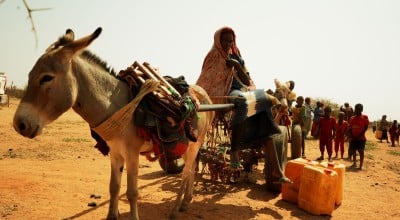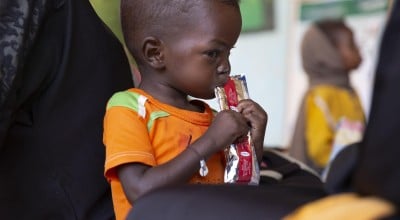
Read our 2024 annual report

Knowledge Hub
Concern warns of major food crisis and “inadequate” response in East Africa
New Concern report, Breaking the Cycle, says more funding is needed for South Sudan and Somalia to cope with food crisis. Current global response is “inadequate".
Concern Worldwide is warning that another major food crisis is looming in a number of drought-hit East African countries – with famine facing the worst affected areas.
Six years since a famine in East Africa affected over 13 million and killed over a quarter of a million people, the region is again in dire and urgent humanitarian need.
The situation is particularly bad in South Sudan and in Somalia where Concern’s country director, Abdi Rashid Haji Nur, today warns that people will be forced to either “move or die”.
Speaking from Somalia were a new president was elected on Wednesday, Abdi-Rashid said:
First, the crops fail, then livestock perish and when everything is gone the people either move or die. Half of Somalia’s population, 6.2 million, require urgent humanitarian assistance and we already have 1.2 million children suffering from malnutrition with 200,000 severely malnourished.
The country director said the food crisis is very urgent and is happening in a country that lost 260,000 people in 2011, half of whom died before the official declaration of famine.
Concern – which has been responding to food and other humanitarian emergencies since 1968 – said 19.5 million people face severe food insecurity in four countries, Somalia (6.2 million), Ethiopia (5.6 million), Kenya (2.7 million) and South Sudan (5 million). Many children in these countries are suffering from severe malnutrition.
Without a massive scale up of humanitarian assistance, it is estimated that in those four countries alone, 35 million people will be unable to meet their daily food consumption needs by July this year.
Concern recently published a report about tackling the root causes of food crises, called Breaking the Cycle, which found that many crises “are predictable” with forecast and data tools that “provide warning of a developing food crisis, creating a crucial window of opportunity to act and lessen its impact on the most vulnerable”.
However, the report said:
Too often the response of governments and donors is slow and inadequate, and the opportunity is wasted. Preventable problems have been allowed to escalate into full-scale crises, increasing the levels of hunger, malnutrition and suffering.
The report calls for an annual $2 billion (€1.87 billion) increase in funding for the next ten years – along with many other actions, including commitments to tackle malnutrition.
Concern Worldwide Chief Executive, Dominic MacSorley, who has seen first-hand the devastating effects of famine and food insecurity in his 30 years as an aid worker, said that as each crisis escalates, so does the cost of responding.
He said:
We have sophisticated early-warning systems but all too often early warning fails to lead to early action. This is preventable but If we ignore what’s happening in Somalia, South Sudan and in other parts of the world, hundreds of thousands, if not millions more people will be struggling to stay alive, fleeing their homes and in need of emergency aid.
For more information or interview requests, please contact Kevin Jenkinson: 0863582886 kevin.jenkinson@concern.net or Eithne Healy: 0872931034 eithne.healy@concern.net.

Other ways to help
Corporate support
Is your company interested in working together for a common cause?
Fundraise for Concern
From mountain trekking to marathon running, cake sales to table quizzes, there are lots of ways you can support our work.
Buy a gift
With an extensive range of alternative gifts, we have something to suit everybody.
Leave a gift in your will
Leave the world a better place with a life-changing legacy.
Volunteer with Concern
The lots of ways to get involved with our work as a volunteer
School fundraising
Without the generous support from schools, we wouldn't be able to do the work that we do.




